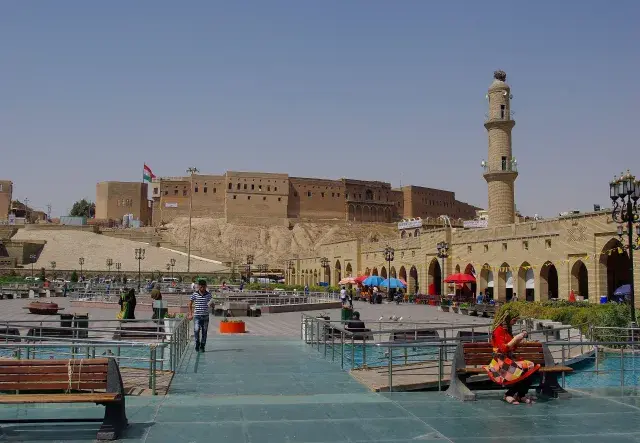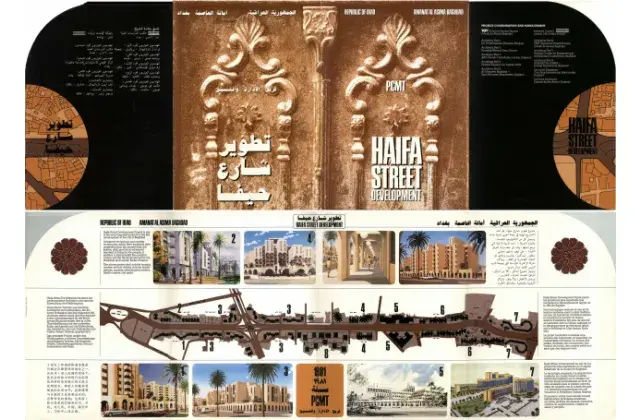View on Kurdistan Iraq (2003 - 2023)

At the end of the American intervention of 2003, the Kurds in Northern Iraq had managed to create a regional government : Kurdistan Regional Government (KRG) comprising the provinces Dohuk, Erbil and Sulaymaniyah with Erbil as its capital. This entity had been federated to the new Federal Iraqi state, established by the constitution of 2005. After almost a century of struggling, the Kurds had finally succeeded to have an autonomous status. But one dispute between Baghdad and Erbil remained, the territorial lines and the oil. The constitution stated that “oil and gas are owned by all the people of Iraq and the federal government shall undertake the management of oil and gas extracted from present fields, provided that it distributes its revenues in proportion to the population” (extract of Articles 111 and 112). Based on the population living in the autonomous Kurdistan Region, the KRG would receive 17 % of Iraq’s total oil revenue. However, this percentage was not explicitly fixed in the constitution itself but rather an interpretation based on population estimates at the time. In practice, the exact share has been a source of contention, fluctuating and being renegotiated over the years. By 2018, the KRG's share had been reduced to approximately 12.67% due to disagreements over population calculations and revenue sharing. This is about the facts. The KRG would continuously challenge the federal government in Baghdad. In 2014, e.g., the KRG finalised a strategic energy agreement with Turkey and started to export its own oil and gas through the Iraq-Turkey pipeline which was against the constitution's regulations. In March 2023, a Paris arbitration court ruled in favor of Baghdad, finding that Ankara had violated the terms of a 1973 pipeline agreement.
The secure situation in the autonomous Kurdistan region attracted many Iraqi to move to Kurdistan. Moreover, the region became a sanctuary for internally displaced people and vulnerable minorities from other parts of the country, especially during the sectarian conflict (2007-2008) and later during the Islamic State of Iraq and the Levant (ISIL) occupation of Mosul province. The Peshmerga forces are the KRG’s legitimate security force. They played a significant role in the co-called battle of Mosul (2016-2017) to retake the city of Mosul from ISIL.
In 2014, when ISIL took control of most of Mosul province, including Kirkuk and its oil fields, the Peshmerga took control of the city of Kirkuk and other northern areas. These areas, retaken from ISIL, are part of the disputed territories that the Iraqi government does not recognise as belonging to the autonomous Kurdistan Region. According to a report by Amnesty International published in January 2016, Peshmerga forces and Kurdish militias conducted a campaign to forcibly displaced Arab communities in areas they had recaptured from IS. The report reveals evidence of forced displacement and large-scale destruction of homes in villages and towns in Nineveh, Kirkuk and Diyala governorates. Apart from the fact that the KRG had long claimed these areas as rightfully theirs, these areas were affected by the Baath Party’s Arabisation campaign (1970s-1990s) which forcibly displaced Kurds and other minorities and settled Arabs in these regions. In 2017, the Iraqi Security Forces retook some of the disputed areas.
This battle around the disputed areas followed the 2017 Iraqi Kurdistan independence referendum. Contrary to the declaration of the federal government of Iraq, the independence referendum was held on 25 September 2017. The results showed that around 93 % of the population in the autonomous Kurdistan Region favoured independence. Even though the KRG declared the referendum as binding, the referendum’s legality was rejected by the federal government of Iraq. Following the failure of the referendum, Masoud Barzani resigned as president.
Apart from the difficult relations between Baghdad and Erbil, the relative security and stability of the autonomous Kurdistan region has allowed it to achieve a higher level of development than in other provinces of Iraq. This included social, cultural, educational and economic growth and it made it more attractive to foreign investment. The region is also attractive for tourism from historical sites such as the Citadel in Erbil to scenic mountainous regions like Amadiya. There are different dialects of Kurdish. The KRG recognized both Kurmanji (in Iraq it is known as Bahdini) – the dialect of the North, and Sorani which is spoken in Erbil and Sulaymaniyah. Both dialects, as well as Arabic, are taught in school. Sorani is the dialect with the most developed literary tradition.
This article was written by Hella Mewis and is licensed under CC BY-NC 4.0.






